Doing exercise in a scientific way _______ (be) healthy for both our body and mind.
Huangguoshu Waterfall is _______ (wide) known to people from home and abroad.
People eat eggs on their birthday in some _______ (place) of China.
Reading makes _______ (we) wiser and more learned.
阅读下面一篇短文,根据其内容填空。
Wind power is a very clean source of energy. This is how wind power works. Wind makes windmills spin(旋转). When the windmills spin, they make electricity. Then we can use the electricity.
A lot of people think that wind power is new, but that’s not true. For thousands of years, people have used wind to sail boats and move water. We still do those things today, but these days we mostly use wind power to make electricity.
Wind power is a very popular source of energy. Most people think that we should use it more and more. First of all, it’s clean. Wind mills don’t pollute the environment at all. Second, we can use wind power forever. After all, we will always have wind. Also, wind power is cheap, and it’s getting even cheaper.
A lot of people don’t understand wind power very well. They believe that there are problems with wind power, but many of those problems are not real. For example, some people say that windmills are dangerous for birds. That used to be true, but it isn’t true anymore. Old windmills killed birds because they spun very fast. New windmills spin slowly, and they aren’t dangerous for birds.
However, there are real problems with windmills. One problem is that many people think windmills are very ugly. This is a problem for some people because windmills are often in very pretty areas. Also, wind doesn’t blow all the time, so we can’t use wind power all the time. Finally, windmills are noisy.
Wind power is becoming more and more common. Right now, more than 80 countries use wind power. About 2.5 percent of the world’s power comes from the wind. For some countries, that number is a lot higher. Wind power gives Denmark more than 25 percent of its electricity.
(1)Wind power can be turned into __________ when windmills spin.
(2)People have used wind to __________ and move water for a long time.
(3)New windmills don’t __________ because they spin at a slow speed.
(4)One of the real problems with windmills is that they __________.
(5)This passage mainly introduces a kind of clean, __________ energy to us.
阅读下面一篇短文,从短文后的选项中选出能填入空白处的最佳选项。选项中有一个为多余选项。
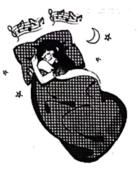
Do you have difficulty falling asleep at night? If so, here is a piece of advice for you: Listen to some soft music.
Scientists have found that soft music can help to improve sleep quality and quantity. It works for people of all ages. ____(1)____ Soft music can help us fall asleep faster, wake up less during the night and feel more rested in the morning. You may not notice the effects overnight, though. It could take as many as three weeks to see any improvements.
____(2)____ The reasons aren’t clear yet. It may have something to do with the relaxing effect of a good song. Music can have real physical effects, too. Soft music can lower our heart rate and slow down our breathing. ____(3)____
Scientists say that for most people, music that has 70 beats per minute (bpm) works best. Classical, jazz and folk music are usually more effective than other musical styles. ____(4)____ You may need to experiment(尝试) to make your own playlists. If you are not sure how many beats a song has in a minute, you can find out by entering its title into songbpm.com. And remember to get the volume right. Make sure that the final piece is one that slowly fades out(渐弱). ____(5)____
It is very important to get enough high-quality sleep. Before you go to bed tonight, play some soft music. Then, just prepare to be rocked off to dreamland!
| A. |
This prepares us for sleep. |
| B. |
Familiar songs work well, too. |
| C. |
Scientists like different kinds of music. |
| D. |
Why can soft music help us sleep better? |
| E. |
If not, you may be woken up by the sudden silence. |
| F. |
And it works much better for people with sleeping problems. |
阅读下面语篇,从每题所给的A、B、C三个选项中选出最佳选项。
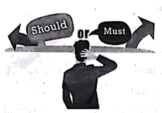
There are two paths (路) in life: Should and Must. We arrive at these crossroads over and over again. And each time, we get to choose.
Should is how others want us to show up in the world—what we should or shouldn’t do. When we choose Should, the risk is small.
Must is who we are, what we believe, and what we do when we are alone with our truest self. Must is why Van Gogh painted his whole life without ever receiving public recognition (认可). Must is why Reyna Marder Gentin started to write for the first time after 23 years of being a lawyer.
Choosing Must sounds fantastic, right? But Must is scary, hard, and a lot like jumping off a high building where you can’t see anything down below. How can we actually choose Must?
Ask yourself, “What is my Must?” If you don’t know the answer, write down your biggest, most impossible dreams! Don’t worry! It’s just the first step.
Now, think about what’s actually in your way. Is it your parents? Maybe they’re just worried that you haven’t thought it through. Try to make a practical(切实可行的) plan for what you want to do. Your parents may find it a good one. Is it money? Well, the best way to make money is to do what you love because it’s very likely that you will pay great attention to it. Choosing Must doesn’t mean we need to give up everything we already have. It’s about changing one small thing at a time.
If you believe that you have something special inside of you, it’s about time you gave Must a try—today.
(1)What happens if we choose the path of “Should”?
| A. |
We don’t need to take great risks. |
| B. |
We have to give up what we have. |
| C. |
We’ll have a clear picture of ourselves. |
(2)The writer develops his idea in Paragraph 3 by ________.
| A. |
listing numbers |
B. |
asking questions |
C. |
giving examples |
(3)What should we do if we choose the path of “Must”?
| A. |
Try to make a practical plan. |
| B. |
Turn to other people for help. |
| C. |
Change many things at a time. |
(4)The writer wrote this passage to ________.
| A. |
take others’ advice |
B. |
be our truest self |
C. |
communicate with parents |
阅读下面语篇,从每题所给的A、B、C三个选项中选出最佳选项。
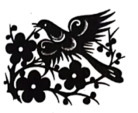
Paper cutting or tearing is a cultural tradition in China. For centuries, it has been passed down from one generation(一代人) to the next, especially from mothers to daughters. This beautiful art created by skillful artists is used to decorate(装饰) doors, ceilings, and beds in people’s homes, or at celebrations such as birthdays and weddings. At Chinese New Year, window flowers are glued to windows, creating beautiful patterns of light and shadow.
The two main techniques(技艺) used are cutting the paper using a knife or scissors, or tearing it by hand. If the paper is cut, the edges(边缘) are very smooth. Paper cutting can produce very fine and delicate work. This type of work is typical of southern China. If the paper is torn by hand, the edges are more simple and natural. Tearing is used more in northeast China. In addition, different parts of China have their own motifs or pictures. These motifs can express many stories, ideas and emotions.
It can be hard to hold on to traditions like these because young people don’t know much about traditional art. Often they prefer spending their time on newer pastimes. The experts are getting older. If young people don’t learn the traditions, they won’t be able to pass them down to their own children. But recently there is a change. There are more exhibitions of traditional art. Artists are going into schools to teach children how to do paper cutting. Children enjoy working together with artists and talking to them about the meaning of their art. In this way, they are becoming proud of their culture and traditions.
(1)The underlined word “motifs” in Paragraph 2 is closest in meaning to ________ .
| A. |
habits |
B. |
reasons |
C. |
subjects |
(2)What is the writer’s opinion on paper cutting or tearing?
| A. |
It is easy to hold on to this form of art. |
| B. |
It will continue in China for future generations. |
| C. |
It is so expensive that only the rich can afford to learn it. |
(3)From the passage we know that ________ .
| A. |
young people know traditional art very well |
| B. |
the edges are very smooth when the paper is cut |
| C. |
girls were not allowed to learn paper cutting in the past |
(4)What could be the best title for the passage?
| A. |
Chinese Paper Art |
B. |
Great Changes in China |
C. |
Famous Chinese Artists |
阅读下面语篇,从每题所给的A、B、C三个选项中选出最佳选项。
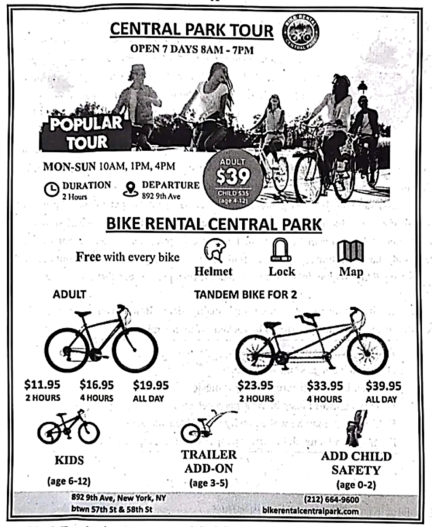
(1)Central Park Tour begins at ________ o’clock in the morning every day.
| A. |
six |
B. |
seven |
C. |
eight |
(2)How much should we pay for an adult bike for two hours?
| A. |
$11.95. |
B. |
$16.95. |
C. |
$19.95. |
(3)A couple will need a ________ if they take their eight-month-old baby.
| A. |
|
B. |
|
C. |
|
(4)What is the text type of the reading material?
| A. |
An ad. |
B. |
A poem. |
C. |
A speech. |
阅读下面一篇短文,从每题所给的A、B、C三个选项中选出能填入空白处的最佳选项。
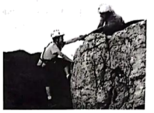
My dad has always spent his free time climbing mountains. He spends ages ___(1)___ his route (路线), checking the weather forecast and finding the best maps. He really likes a good ___(2)___. For example, he always chooses the most difficult way up the mountain. It means he feels he’s really ___(3)___ something.
As soon as I could walk, he started taking me with him sometimes. At first, he used to carry me on his shoulders. Later on, I had my own little boots (靴子) and I ____(4)____ him up the easiest slopes (斜坡). I can still remember how excited I was when we set off and how ____(5)____ I felt.
The first time I did a proper climb with him, I was about eight years old. As we came round the last bend to the summit (山顶), we ____(6)____ some other climbers standing there enjoying the view. They couldn’t believe my father had managed to get to the ____(7)____ with such a small child. In fact, we weren’t the only ones who managed to do so that day. When we were coming down, we met another family with two ____(8)____ girls, who must have been just behind us.
I’m now 15 and I belong to a local climbing club. Dad ____(9)____ hoped to pass on his love of climbing to me. It seems that he has. I already spend most of my weekends in the ____(10)____. Sometimes Dad comes too but now I’m the one out in front and he can’t always keep up with me!
(1)
| A. |
planning |
B. |
describing |
C. |
explaining |
(2)
| A. |
partner |
B. |
challenge |
C. |
suggestion |
(3)
| A. |
lost |
B. |
missed |
C. |
achieved |
(4)
| A. |
pushed |
B. |
guided |
C. |
followed |
(5)
| A. |
tired |
B. |
happy |
C. |
lonely |
(6)
| A. |
saw |
B. |
recorded |
C. |
interviewed |
(7)
| A. |
top |
B. |
hole |
C. |
corner |
(8)
| A. |
wise |
B. |
young |
C. |
strong |
(9)
| A. |
never |
B. |
hardly |
C. |
always |
(10)
| A. |
forests |
B. |
markets |
C. |
mountains |
阅读下面一篇短文,从短文前的选项中选出能填入空白处的最佳选项。选项中有一个为多余选项。
|
A. in B. how C. but D. enough E. some F. the G. and |

Born into a Yao family in Yizhang, Hunan, Jiang Mengnan’s world has been silent since she was 6 months old. At that time, ___(1)___ medicine damaged(损害) her hearing. But through her hard work, she did well at school and university. She started studying for a doctorate(博士学位) at Tsinghua University ___(2)___ 2018.
When Jiang was about one year old, her parents began showing her ___(3)___ to understand people by reading lips (嘴唇). It was really hard, but soon Jiang learned to “listen” and even speak. Jiang’s mother says she’ll never forget ___(4)___ day Jiang said “Mama” for the first time when she was 16 months old.
When she was old ___(5)___, Jiang went to a primary school instead of a special school for disabled children. She said it was difficult at first. During lessons, she had to copy down everything on the blackboard and study alone after class to keep up with her classmates. Jiang did quite well at school ___(6)___ made it all the way to Tsinghua University.
“I’m always thankful that my parents, teachers and friends never give me special attention, so I never thought I was different from anyone else,” Jiang said.
Reading Expression
In China, more and more people have realized the seriousness of climate(气候) change. Many young people have been living a low-carbon(低碳) life.
Zheng Xiyu is one of them. She has been trying to reduce her carbon footprint. Every morning, she takes a bus to her office and it takes her about 40 minutes. But Zheng has been thinking of changing this. She wants to try a different means(方式) of transport—cycling. Riding a bicycle to work, the lady says, takes about the same amount of time as taking a bus. “However, it’s better for the environment and my health.” she says.
Professor Li Lin has also been leading a low-carbon lifestyle. Her office uses energy-saving lights. These lights go off themselves when they are not needed. This has saved a large amount of electricity. Another way to save energy is to double-print the paper. Professor Li says small actions like these are important for protecting the environment. “Let’s say you have saved one ton of paper. That’s about two and a half tons of CO2.” Professor Li says.
Lin Hui always chooses products with a longer life when he shops. He says this helps to reduce waste. Two years ago, Lin and his friends set up an environment website, where he wanted to give some advice on saving energy and protecting the environment.
It’s easy to change to a low-carbon lifestyle. Everybody can do this and make a difference.
Use words with proper meanings and grammatical rules to fill in the blanks.
(Only one word for one blank.)
(1)In China, more and more people have realized climate ________ is becoming ________ .
(2)Zheng Xiyu prefers ________ to taking a bus to ________ her carbon footprint.
(3)Professor Li Lin says doing ________ things is ________ for protecting the environment.
(4)Lin and his friends set up an environment website ________ ________ some advice on saving energy and protecting the environment.
(5)It is not ________ for everyone to change to a low-carbon ________ if he or she takes action.
Fill in each blank with a proper form of the word given or a proper word.
Zhang Guimei, ____(1)____ is the headmaster of Huaping High School for Girls, has been given the title(称号) “Role Model of the Times” for ____(2)____ (help) girls from poor families.
She moved to Lijiang to teach in the middle school in Huaping county ____(3)____ the age of 17. Once, she got badly ill but had no money. The local people raised money ____(4)____ helped her. “From then on, I told myself that I must do something for those people who helped me.” Zhang said.
She was sad when she saw her ____(5)____ (student) couldn’t afford to go to school. ____(6)____ (slow), a dream appeared in her heart. In 2008, she managed ____(7)____ (found) the Huaping High School. This is ____(8)____ free school for girls from poor families. When people asked why she worked so hard, she just said, “I hope these girls can live a ____(9)____ (happy) life than me.”
With her great efforts, she _____(10)_____ (send) more than 1, 800 students to universities so far.
Choose the best answer to complete the passage.
The journey Betty had with her swimming was long but beautiful. She suffered some terrible illness in her early childhood. After years of ___(1)___, she finally became healthy.
Two years ago, while Betty was watching a sports program, a dream came into her head—to be a swimmer. Last summer, she wanted to ___(2)___ a local swimming team. So she practiced hard and finally ___(3)___ in being a member of it. However, the team training was a difficult start. She coughed ___(4)___ in her first few weeks. But she didn’t want to ___(5)___. She kept swimming and didn’t miss a single practice. She had a strong will to be the best she could be. ___(6)___ there were many difficulties, nothing could keep ___(7)___ trying.
Then came the final award (奖项) ceremony at the end of the year, Betty didn’t ___(8)___ any award but was still there to cheer on her friends. With the ceremony near the end, she suddenly heard the coach announcing (通知), “The highest honor (荣誉) goes to Betty! She has inspired (激励) us with her ___(9)___ and love.”
It was the ____(10)____ moment of Betty’s life. With all she had been through in her ten years, this was the hour of true success.
(1)
| A. |
treatment |
B. |
trouble |
C. |
silence |
D. |
experience |
(2)
| A. |
enjoy |
B. |
join |
C. |
complete |
D. |
build |
(3)
| A. |
failed |
B. |
worked |
C. |
succeeded |
D. |
arrived |
(4)
| A. |
luckily |
B. |
quickly |
C. |
hardly |
D. |
badly |
(5)
| A. |
get up |
B. |
give up |
C. |
turn up |
D. |
make up |
(6)
| A. |
Until |
B. |
Unless |
C. |
Although |
D. |
Since |
(7)
| A. |
from |
B. |
into |
C. |
off |
D. |
for |
(8)
| A. |
find |
B. |
expect |
C. |
take |
D. |
lift |
(9)
| A. |
will |
B. |
pride |
C. |
wisdom |
D. |
honesty |
(10)
| A. |
deepest |
B. |
earliest |
C. |
youngest |
D. |
greatest |
Choose the sentences to complete the passage.
(Two sentences are extra.)
How Can You Create Luck in Everyday Life?
What is luck? It is agreed that more good things happen to some people. Let’s just call that luck. Now would you like to be one of these lucky people? ____(1)____.
Feel lucky about what you have
____(2)____, but they just don’t know it. Instead of giving all your attention to what you are short of, look at how lucky you are already. You no doubt have some wonderful friends, and a roof over your head.
____(3)____
Luck doesn’t just happen to you—it comes to you when you’re open. Learning a new skill, visiting a new place and trying a new hobby are all great ways of creating your chances.
Do it right now
You’ll never create any luck if you sit there waiting for it to fall into your lap(大腿). ____(4)____. You will find you create more luck in everyday life.
Ask for help if necessary
Sometimes people would be ready to help you out. ____(5)____, don’t wait for others to offer you help but go and ask them if they will give you a hand.
| A. |
Try special things |
| B. |
Try something new |
| C. |
When you are busy |
| D. |
If you are in trouble |
| E. |
Some people are already lucky |
| F. |
Act towards your goals and dreams at once |
| G. |
Here are 4 top suggestions for creating your own luck |